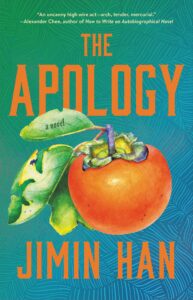
Jimin Han on Letting Your Experiences Simmer
"Fragments might turn into something I can’t see as a whole right now."
This first appeared in Lit Hub’s Craft of Writing newsletter—sign up here.
There was a fire at my house two months ago. I’ve been trying to write about it for weeks now, but each draft doesn’t rise above the “who cares” waterline of worthiness. The thing I want to say beyond describing the fire to you and the shock that it happened is the way my mind keeps ducking into “what if” scenarios of that night without prompting. My imagination can’t help but take off in multiple directions: What if we hadn’t woken up? What if we’d been trapped inside? What if we couldn’t get help?
Everyone is safe. Here’s what happened: an unoccupied house across the lane from us burst into flames, fire trucks arrived, and then that blaze spread to our house, which resulted in fire fighters turning their hoses toward us but not after quite a bit of damage had been done because no one expected it to happen.
The destruction threw me and my family off balance. It will require many months to restore our home.
But what does it mean? How do I shape it into what it means? Why am I trapped thinking of other nights from long ago when sirens sounded on our street, other nights when homes were lost?
I’ve relied on my ability to consider the possibility of what if’s for my work in the past. The writer Ed Lin wrote an entire series prompted by it. He says: “Much of my protagonist in my Taipei mysteries is based on the premise, ‘What if I had grown up in Taiwan?’ I even gave him my Mandarin name, which my grandfather had given me.”
This fire in my life feels different. In the past, writing has always helped me sort out emotions, analyze, and shape experience into something I can share with others. This time, the writing feels haphazard. I feel unable to use my imagination in a constructive way.
The feeling is not unfamiliar: The same happened with my new novel, The Apology. It didn’t occur to me when I started writing this piece to you, but here it is: hope.
For years I wrote short pieces about the feeling of longing for someone and put these fragments into a folder called “Missing” because that’s what I thought the book would be about. It was drawn from memories of my grandmother, who raised me until I was four years old and then never saw again after we moved to the United States. It was also drawn from memories of hearing my father talk about his mother whom he was separated from during the Korean War. On his lowest days, I wondered if he’d ever get over the pain of losing her.
Fragments might turn into something I can’t see as a whole right now.
These musings of sorrow were no longer than a few pages. But the language in them kept bringing me back to them, sentences that hung together like strands of something bigger than themselves. Anytime I read them to my writers group, they said they wanted more. Around 2018, I had a brief chat with the novelist and essayist Alexander Chee. He’d posted some details about travel to South Korea and his family in Maine that made me wonder if we were related. Turned out we weren’t cousins, but he encouraged me to write a story about it anyway.
This was a pivotal point in the development of these fragments into a sustained work of fiction. I began to ask questions of these pages in a different way. Who was the character who was missing someone? Why did her longing persist? Surprisingly, another character emerged who was also suffering, but this woman was angry. Instead of keeping her sadness to herself, this character shouted from every rooftop at the unfairness of her lot in life. The first character would become Jeonga, the 105-year-old protagonist of The Apology who lived in Seoul, and the second character developed into Taeyang, her niece, who had grown up in North Korea.
The rest of the novel developed quickly from that point, spurred on by Anne Tyler’s novel, A Spool of Blue Thread, which made quite an impact on me. *Spoiler* Abby Whitshank dies early in the book. Surprise! The book is about the entire Whitshank family, but we’d just gotten to know Abby. I couldn’t believe Tyler had the audacity to make such a choice. But the reason was clear: as the reader I was even more curious to discover the answers to questions Abby had but would never know.
Tyler’s novel inspired me to allow Jeonga’s obstacles to become exponentially more difficult to overcome. When I went deeper into who she was as a character, the plot of the novel revealed itself.
The Apology is entirely different from A Spool of Blue Thread, of course. Life and death, as my parents had explained it to me, the questions I had about Korean culture that were particular to my mother, and the beliefs she had, all came roaring to the forefront when I was writing drafts of this book. At the time, we were also at the very beginning of the Covid pandemic. Death was omnipresent in a way we had not experienced it as a collective before.
Maybe the connection between the novel and my experience of the fire contains a possible answer for me yet. Fragments might turn into something I can’t see as a whole right now. I keep writing about odd observations: There are no fire hydrants where I live; smoke can’t be washed out of a swimsuit; why was the firefighter who told me my house was on fire familiar to me?
What might be the pivotal conversation that turns on the what ifs for me that lead my fire fragments into a complete essay or longer work? My book editor has already pointed to a single paragraph that is a keeper. To save it and any others that might come, I’ve created a folder for them. I won’t tell you the name of it for now. Writer’s superstition?
___________________________________________

The Apology by Jimin Han is available now via Little, Brown.
Jimin Han
Jimin Han is the author of The Apology, a Barnes & Noble Discover Pick; a best audiobook by Booklist; and a best book of the summer by the LA Times, Vanity Fair, Shondaland, Apple Books and more. She is also the author of A Small Revolution. Her work has been supported by the New York State Council on the Arts.



















